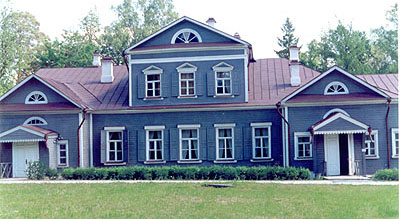Unit 10:
A Marvelous Decade
Photo of the Aksakov family's Abramtsovo estate


In the 1830s and 1840s, Russia experienced a profound cultural/intellectual awakening. Russian literature emerged on the national stage for the first time with the publication by Nikolai Gogol (1809-1852) of his novels, The Inspector General (1836) and then Dead Souls (1842). There was also Mikhail Lermontov's (1814-1840) influential novel, A Hero of our Time (1840). Russian poetry flowered in the works of Lermontov, Taras Shevchenko (1814-1861) and Aleksandr Pushkin (1799-1837), who became Russia's national poet. Literary criticism, emboldened by the work of Vissarion Belinskii (1814-1840), played a key role in shaping the dimensions of this emerging Russian literary expression. Finally, Mikhail Glinka (1804-1857), the founder of Russian national music, finished his operas A Life for the Tsar (1836) and Ruslan and Ludmilla (1842).
Along with the emergence of some true Russian cultural forms, Russian intellectuals engaged in lengthy conversations about the future of Russia. Sometimes those discussions took place over tea in someone's pleasant salon; sometimes over a cappuccino in a coffee house (café!); sometimes over a glass of wine in the countryside; and, sometimes even in print. In the latter case, writers resorted to the use of Aesopian language to foil the censorship. This was a method of using coded language to foil government censorship. For example, references to a "hawk" would technically be read by the censor as referring to the bird of prey, but the author's use of "hawk" might actually refer to some particular ideas of Professor Ivan Ivanov. Instead of openly criticizing something about Russia in print, which would not have been allowed, an author might instead choose to publish "fictional" "letters" from a Frenchman to his wife, filled with the same veiled critique. Or consider the case of Ivan Turgenev's (1818-1883) collection of short stories, Zapiski okhotnika (A Sportsman's Sketches). In 1847 he published the first of these short stories, "Khor’ and Kalinych," in the journal Sovremennik (The Contemporary). The title of the collection, "A Sportsmen's Sketches," was for the benefit of the Russian censorship. The stories, at first glance, were simply about a noble out hunting with some of his serfs. In reality, the stories depicted the humanity of the Russian peasant (and the inhumanity of the Russian nobility)--This, the idea that peasants were real people, proved to be an eye-opening revelation for most educated Russians. So, from the censors point-of-view, the stories dealt with hunting; from Turgenev's point-of-view the stories clearly indicated the time was right to free the Russian serf from his noble masters. Most of Russian writing from the mid-1830s onward was always filled with underlying meanings and symbolism.
In any case, the Russian intellectuals of the 1840s felt that Russia needed a new direction. Over the course of about a decade, gradually two opposing viewpoints emerged about how Russia should develop: the Westernizers (sometimes also termed the "Westerners") and the Slavophiles.
Both ideological groupings, and this entire intellectual/cultural enterprise of the 1840s, signalled the emergence of an "intelligentsia" (интеллигенции) in Russia. In simple terms, one can define "intelligentsia" merely as the "intellectual elite of a society." In the specific case of Russia, the idea of an "intelligentsia" had far broader connotations with allusions to the elite as the moral conscience of the country, with a concomitant sense of responsibility for the country's well-being, with the idea that Russia's future progress depended on the cultural achievements of the intelligentsia, and with the idea that the intelligentsia was to play the role of a political opposition to the autocratic regime.

- Read the textbook chapter 28.
- Check the remarks by Professor Blois and Professor Evans on the 1840s.
- Study the Questions to Consider and the Key Terms for the Unit.
- Submit the Belinskii paragraph.
- Post (or respond) your thoughts/ideas about this Unit's reading and assignment in the Blackboard online discussion forum. Do not post your assignment there.
- "The bronze horseman" by Pushkin
- The Bronze Horseman statue St Petersburg.mov
- 1/7 Isaiah Berlin - Final Lecture on the Roots of Romanticism
- Pushkin Museum
- For extra credit please suggest to your instructor a relevant video for this unit of the course. Send the title of the video, the url and a brief explanation of why you find the video interesting and applicable to the material that is being studied in this unit.
- For 50 points maximum extra credit, read Isaiah Berlin, A Marvelous Decade, 1838-1848 (1955-57) and write a one-page paper that answers the question, "What did Berlin find so 'marvelous' about Russia in the 1840s?"
- For 50 points maximum extra credit, read Aleksandr Herzen, My Past and Thoughts (1852-66) and write a one-page paper that explains how Herzen evolved his particular brand of Russian populism.
- For 50 points maximum extra credit, read Pavel Annenkov, The Extraordinary Decade (1928) and write a one-page paper that answers the question, "What did Annenkov find so 'extraordinary' about Russia in the 1840s?"...
- For 50 points maximum extra credit, watch either The Charge of the Light Brigade (1936) or The Charge of the Light Brigade (1968) and write a one-page paper assessing the film's historical accuracy. I suggest the 1936 film.